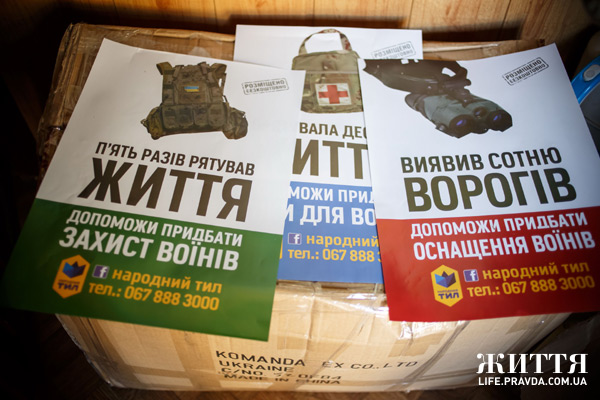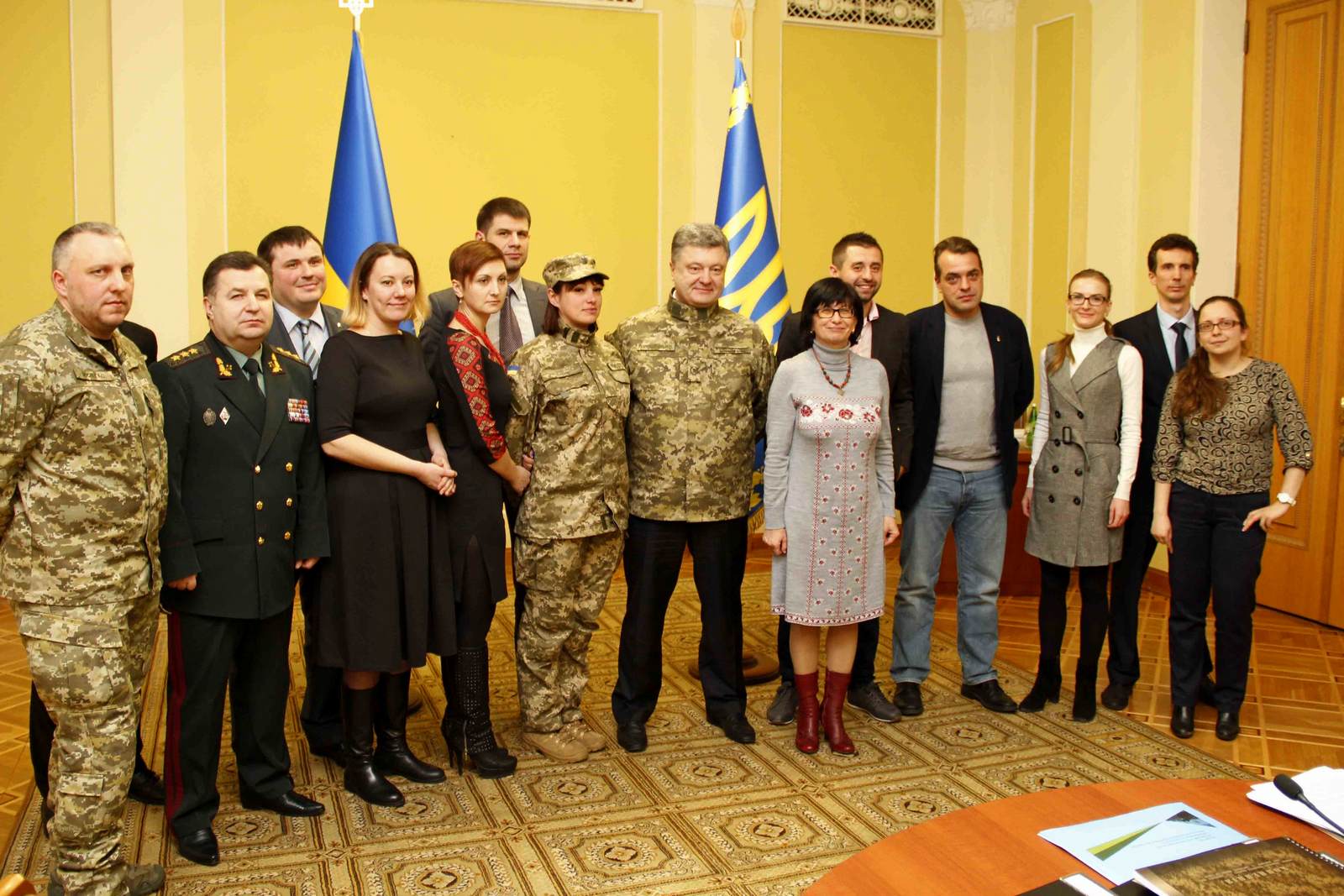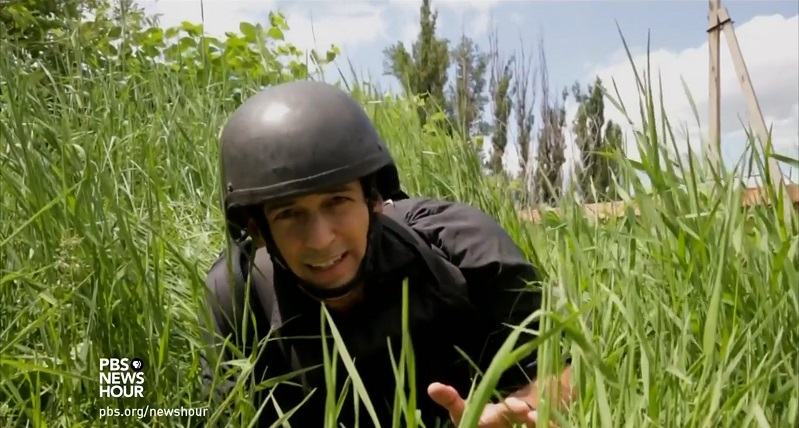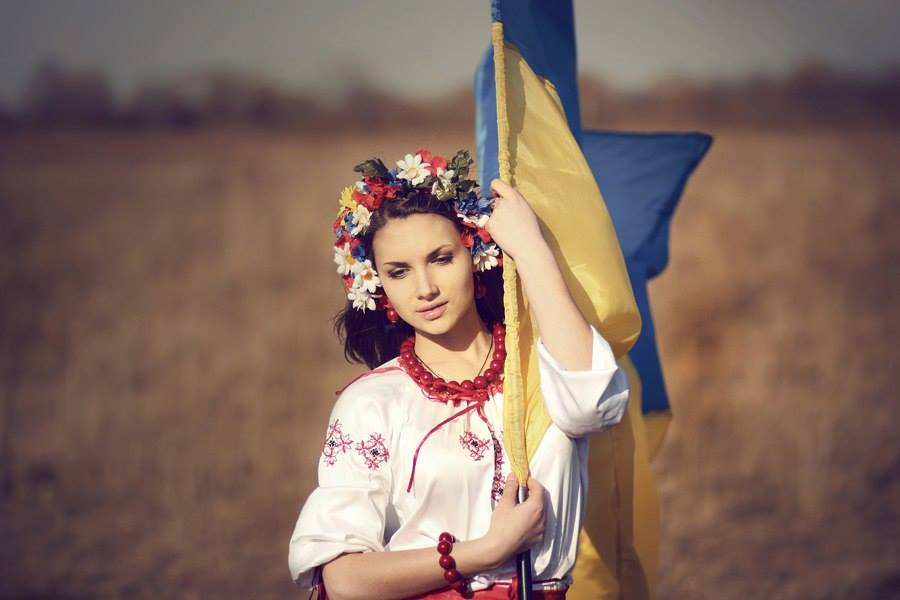The role of volunteers in sustaining the Ukrainian armed forces against the backdrop of Russian aggression cannot be overestimated.
In 2014, the Armed Forces of Ukraine lacked troops, capacity, and resources. On 28 February 2014, at the onset of Russia’s annexation of Crimea, then Minister of Defense Ihor Teniukh made it known that the amount of deployable troops was around only 2,000, and only 4% of Ukrainian troops were supplied with helmets and bullet-proof jackets.
Then, volunteers rushed to rescue the bleeding Ukrainian army and became one of the most influential and trusted social groups in Ukraine.

The boom of volunteer social initiatives was extraordinary: the figure of Ukrainians involved in volunteer activities rose from 14% to 23% after Euromaidan. 70% of them were aimed at helping the military. According to the latest sociological polls, volunteers are still the #1 most trusted group in Ukrainian society, and the social media pages of some volunteers became an information source for dozens of thousands of citizens, as well as a way of influencing top officials, including ministers and the president.
Now, from the distance of several years, we must address the question: did the volunteers change the government’s ability to protect itself, or, if a serious escalation happens again, will ordinary citizens provide the army with everything, starting from socks and potatoes to drones and infrared cameras?
The goal of the research at the core of this article was to answer this question.
The data for analysis came from public interviews of representatives of well-known volunteer organizations such as Wings of the Phoenix, Come Back Alive, Army SOS, and the People’s Project, as well as informal interviews conducted by the author with the representatives of these organizations and former participants of the so-called “Volunteer Force,” a group of military volunteers who briefly engaged with the structure of the Ministry of Defense. The assumption was that the volunteers did make a positive impact on the state if it increased its capacity to procure for the army, and if the need for volunteer support decreased.
Volunteer organizations: what next?

As of 2016, the basic necessities of the army, like bullet-proof jackets, helmets and uniforms, were already provided by the state, and the number of volunteer organizations, as well as the amount of donations, began to decrease.
This was especially true for smaller volunteer initiatives, like the regional departments of Wings of the Phoenix.
The volunteer teams also fell in numbers. For instance, the People’s Home Front core team decreased from 30-40 people in 2014 to 4-5 in 2017.
The personalities changed, too – people returned to their more “normal” lives or, on the contrary, entered politics – like Heorhiy Tuka, who now occupies a position in the government, or Tetiana Rychkova, who is now an MP. However, another major volunteer organization, Come Back Alive under the leadership of Vitalii Deineha, is being transformed into an NGO in order to qualify for Western public and private grants.
Other well-known volunteer initiatives reoriented themselves to fill in unique niches, which the state didn’t manage to fill – thermal imaging cameras, drones, tablets with ballistic software and electronic maps, development of artillery fire control systems, etc.

According to one of the most renowned figures Vitaliy Deineha, volunteers provided over 50% of the whole stock of thermal imaging cameras to the Ukrainian armed forces in the conflict zone.
Another direction for the activities of volunteer organizations were professional courses and training, like for sappers by Come back alive, or snipers (Сombat.ua).
The activities of some organizations evolved to cover the needs which arose as a result of the armed conflict, e.g. professional psychological support to troops at the frontline (Come Back Alive), development of regeneration systems for seriously injured troops (The People’s Project) and care for families of dead soldiers (The People’s Home Front).
Another success cooperation story is from the The People’s Project, which developed a concept for anti-accumulative screens for armored vehicles, while the engineers of the research institute at the Ministry of Defense increased its effectiveness four-fold.
But the interaction of the volunteers and the state had its weak spots. The inability to legally import many types of equipment, some of which required a special permit from the State Security Service, across the border led to the existence of a legal “gray zone.” The absence of a prodecure to officially register such equipment within the structures of the armed forces made it impossible to make somebody responsible for it, which led to abuse.
Because of this, the volunteers were even forced to conduct their own “audit” of the supplied equipment.
Against the backdrop of widely reported bureaucratic reluctance to accept and register the technological resources provided by volunteers (de facto already in use at the frontline), the volunteers were continually at risk of being charged with criminal or administrative offences. This legal conflict—with volunteers strengthening the state’s defense capacity by effectively breaking the state’s law—reached its pinnacle when the Prosecutor’s General Office opened a criminal case against one of the volunteers, David Arakhamia. This triggered a flashmob on Facebook, with volunteers publicly declaring things they had had to smuggle in order to support the armed forces.
According to the volunteers, the bulk of their communication and needs assessments are effected directly with the frontline units and not through the Ministry of Defence, allowing them to identify the armed forces’ needs first-hand.
[/box]But the volunteers are aware that the principle of “substituting for the state” can’t work in the long run.[/box]
They would also point out to the problem that the armed forces themselves found it easier to work with volunteers who would provide them with the necessities quickly, efficiently and without any bureaucratic hurdles. Hence, they preferred to file requests with volunteers rather than with the Ministry of Defence, even if the goods requested were available in state warehouses. The volunteers believe that the Ministry of Defence ultimately became accustomed to relying on them.
The “farewell post” of Pavlo Kashchuk (“Combat.ua”) summarized the moods and thoughts of many volunteers:
“We had to do everything to hold until the reforms start, until the new correct processes are launched, until the state learns to sustain the military with its own resources. We were so focused on these tasks that we got carried away and didn’t even notice a year and a half passing while the system didn’t start working. […] And the volunteers are also partially to blame. Alas, we relaxed the Armed Forces, relaxed the government, relaxed the state.”
As Roman Sinitsyn from "The Home Front" summed up in his own farewell post,
“rehabilitation, psychological and legal help, treatment, various training centers, repairing optics, large infrastructure projects, hi-tech industry projects are all needed more now than just mere ‘buying-delivering.’”
The "Volunteer Force": attempting to penetrate the Ministry of Defense

Another studied case was the "Volunteer Force", an experiment of "infiltrating" volunteers into the Ministry of Defence.
August 2014 saw the start of an unprecedented experiment to let the most active military volunteers enter the system of the Ministry of Defense.
Conceived by the Minister of Defense Stepan Poltorak and Yuriy Biriukov, a Wings of the Phoenix volunteer, the “Volunteer Force” consisted of six people who wanted to change the state institution from within. With their wages paid by a crowdfunding program and with no official status for most of them, the volunteers focused on solving the most sore and challenging domains at the Ministry, namely, provision and procurement – areas where the most rampant corruption occurred and where the volunteers had the most expertise.
Despite having no reform strategy, one of the key achievement of the volunteers was the introduction of the system of public electronic tenders, Prozorro, Ukraine’s hallmark corruption-fighting “success story,” for public procurement inside the Ministry. They also managed to conclude contracts with new providers, cutting off some corrupt schemes.
As a result, Ukraine’s Minister of Defense Stepan Poltorak admitted that the “Volunteer Force” provided crucial assistance in public procurement, both by administering procedures and informing the Minister, in contrast to some “impartial” bureaucrats of the Ministry. The “Volunteer Force” project paved the way for the Project Office of Reforms at the Ministry of Defense, launched in August 2015.
This is explained, on the one hand, by the resistance of interest groups (benefiting from old corrupt schemes) and mid-level bureaucratic inertia. On the other hand, the Volunteer Force members lacked vision, strategy, professional capacities and resources, being too few to push reforms through and realizing the unsustainability of their sporadic reform efforts.
The research revealed the double-edged effect of volunteer activities on defense reform. To answer the questions posed at the beginning of the article, it would be safe to say that volunteers strengthened the state’s defense capabilities and weakened them at the same time.
- On the one hand, volunteers were able to support the state at the time of its critical weakness and withdraw when the state capacity increased in those areas of provision and procurement, which were relatively easy to fill in.
- On the other hand, it was convenient for the military to rely on volunteers rather than demand systemic changes.
In addition, substitution for the state by the volunteers is further observed in numerous spheres which regard the high technologies, treatment and rehabilitation, assistance to families of wounded and dead, etc.
In terms of state-building the result of the "volunteer experiment" is ambiguous - both a plus and a minus.
However, in terms of building civil society and civic responsibility and consciousness – it is a clear plus.

This article is an abridged version of the article “Substituting for the State: The Role of Volunteers in Defence Reform in post-Euromaidan Ukraine” dedicated to the legacy of the Euromaidan Revolution. The article belongs to the Special Issue “Civil Society in Post-Euromaidan Ukraine”, co-edited by Burlyuk O., Shapovalova N., Zarembo K. And published in Kyiv Mohyla Law and Politics Journal, Issue 3, 2017
Read also:
- Almost Four years into Russia’s war, Ukrainian front Line volunteers still play crucial role
- Verified ways to help Ukraine
- Volunteers, civil society and the army: united in face of the enemy
- Ordinary people who do extraordinary things. Devoted to Ukrainian volunteers
- Canadian volunteers fed up with Ukrainian government’s inaction, issue ultimatum
- Volunteers are creating a drone revolution for Ukraine’s army
- Ukrainian volunteers start restoring Ukraine’s broken naval fleet
- Volunteers announce basic needs for frontline troops
- Canadian volunteers tackle bureaucracy to develop prosthetics in Ukraine





